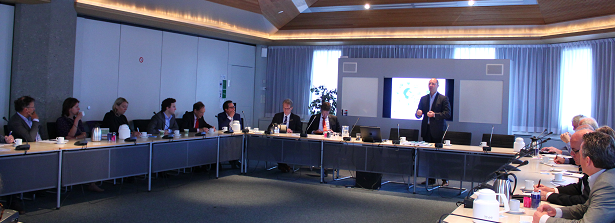Changing the Food Game, understanding agro-systems to support transformation

As stated in their letter to parliament, the Dutch government has called on partners from the private sector, civil society and knowledge institutions to use the strengths of the Netherlands to eradicate hunger worldwide within a single generation while establishing a sound basis for sustainably feeding nine billion people by 2050. On June 2, 2015, a follow-up meeting was organized by the Ministry of Foreign Affairs to further discuss and elaborate on Dutch food and nutrition security policy. Lucas Simons, Director of New Foresight and author of Changing the Food Game, debated on the world food problem with a select group of experts.
Lucas Simons spoke about the need for radical, systemic change in global agricultural systems. However, first the “food game” needs to be understood. Simons argues that even though symptoms might be different in various agricultural sectors, in essence there are similar underlying drivers that cause system failures. He urges the importance of understanding these dynamics in order to change the “game”. According to the author, a sector either competes on poverty (a failing system) or a sector competes on efficiency (a winning system). When a system is failing, market transformation strategies are needed. Simons has introduced a strategy, formula and model that could help recognize patterns and phases of change. This could guide leaders to drive systemic change as those different phases require a different form of leadership. Four important drivers could cause system failure and in fact define the archetype of a sector:
- What are barriers to enter markets and barriers for success for farmers?;
- What do markets rewards?;
- What is the enabling environment?;
- What are alternatives for farmers?
An important message in moving towards a more sustainable system is that market transformation primarily means actors need to work together towards a higher level of connectedness and therewith a higher level of “connectability” within the system. Reaching this implies creating the right circumstances for actors to work together on shared solutions towards change. Four phases of market transformation (inception, first movers, critical mass, level playing field) can be identified and these should all be managed differently. Simons stresses that the Dutch government should become a partner in transformation where firstly leadership on innovation is addressed. Later in the following phases, political leadership in combination with systemic interventions should be created to level the playing field. Thusly allowing projects to move beyond competition and towards more collaborative action and system thinking.
Paul Schoenmakers, expert on sustainable value chain policies at the Ministry of Foreign Affairs, explained that the current strategy of the Dutch government has already shifted towards more targeted interventions that are dependent on the transformation process. For example, stopping illegal practices in the value chain in comparison to the support of the front runners. Wijnand van Ijssel, expert on food and nutrition security at the Ministry of Foreign Affairs, expressed his agreement of the proposed market focus and its appropriate fit with the current Ministry’s approach. He did however refer to the challenge in translating the presented concept to short local food chains. Participants of the debate also highlighted the strong focus on internationally traded commodities, such as coffee and cocoa. The approach was questioned regarding local nutritious commodities, such as horticulture or dairy, with its more direct impacts on food and nutrition security. In addition, global trends, local dynamics, diversification and changing food patterns (increased animal protein intake) are “game changers” to consider. Furthermore, Frank Mechielsen of Hivos challenges the systemic change by market transformation when there is not enough value in the sector. Ruerd Ruben, from LEI Wageningen UR (who wrote a review of ‘Changing the Food Game’), expressed a more sceptical note on the envisaged outcomes of market transformations regarding the benefits for smallholder farmers and rural workers. Currently, the market revolves around the middle players in the supply chain and not the farmers themselves, so modifications need to be made there as well.
It was recognized that the global food producing system is highly complex and when striving for systemic change it needs to be addressed as a complexity. Thus a mindset change is required and it is necessary to first understand the underlying causes of problems before creating solutions. Addressing the problems in the transformation phase they are in could help create more targeted goals for the long term. According to Simons, a stronger vision and a more systemic, overarching approach with a collective framework is the way forward.
Please follow this link to download the PowerPoint presentation of Lucas Simons (PDF).





